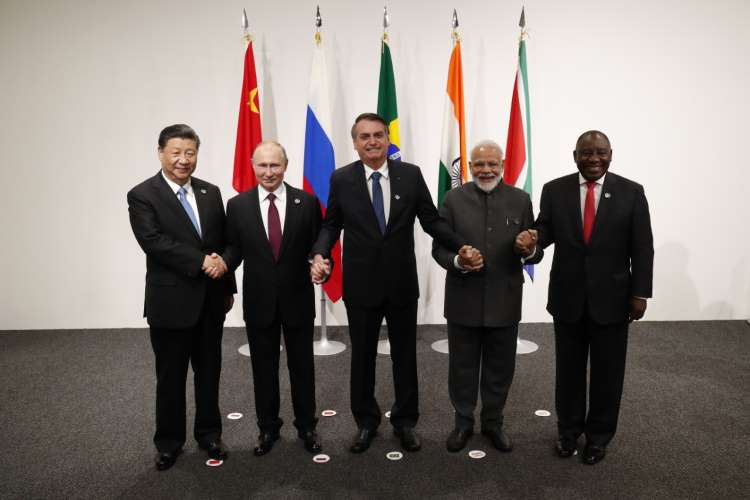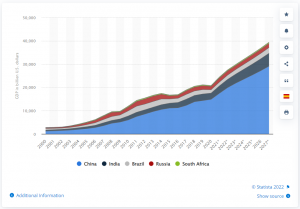
The term BRIC (Brazil, Russia, India, China) was coined in 2001 by the then-chairman of Goldman Sachs Asset Management, Jim O’Neill, and his research assistant Roopa Purushothaman. It took almost 8 years for the idea to be crystalised into the first-ever BRIC Summit in 2009. South Africa was added to the equation in 2010 to make it BRICS.
A grouping of emerging economies that are home to large populations and impressive economic potential, BRICS has come a long way to champion the cause of the developing world and to challenge the pro-West bias of the global economic and financial governance and architecture. BRICS nations account for approximately 30% of the total land area, 41% of the world population, 25% of the total global GDP, and 18.5% of global trade.
GDP of BRICS countries ($ billion)

A period of more than a decade is long enough to appraise BRICS’ achievements and strategies. The entire period of existence of BRICS has been full of challenges, crises and cataclysm. BRICS has indeed withstood the test of time amid challenges such as the sub-prime crisis, eurozone crisis, global recession, trade slowdowns, wavering forex & security markets, trade & tariff wars, Covid-19 pandemic, supply chain disruptions and catastrophic civil and military conflicts. Traversing an evolving geo-economic landscape did not allow the grouping to take wings to newer heights.
READ I Energy crisis may trigger European recession, social unrest
BRICS in a changing world
The changing world order demands that BRICS should evolve mutually inclusive perspectives, purview and realm to build a world order based on peace, comprehensive global governance, and inclusive and respectful security as well as a geo-strategic framework aimed at balance of power in all spheres affecting the developing world. It should not limit itself to mere economic, social and financial cooperation.
The evolving global situation is facing headwinds on many fronts. It has to deal with economic, security, and geo-strategic changes that are shaping the global alliances and partnerships. It is high time that BRICS expanded its scope by adding new partners confronted with similar challenges, and complementing its purpose, outreach and advocacy. Bangladesh, Egypt, Paraguay and the UAE have already become members of BRICS’ New Development Bank.
Some other nations that can make it to the BRICS grouping as members are Argentina, Indonesia, Nigeria, Saudi Arabia, and the UAE as they represent the Global South. These are evolving economies that support the multilateralism advocated by BRICS.
This is essential to build and nurture international relations based on mutual respect, fairness, justice, and cooperation, rather than war or interventions. These countries are confronted with similar socio-economic problems as BRICS members and hence can put a joint, concerted and aligned front at global policy institutions such as WTO, WHO and other UN bodies.
READ I India slips on Human Development Index as Covid-19, Ukraine crisis weigh
Decline of the West
BRICS should fill in the vacuum created at the global level by the declining power of the Western Bloc, especially the partial disengagement of the US from the Middle East, persuasive self-centered diplomacy, conditions-based economic assistance, and coercive imposition of capitalist agenda. Saudi Arabia is the largest economy in the Gulf region and the UAE has emerged as a gateway to regional trade with its ever-expanding global reach as a trading, financial and logistical hotspot.
Nigeria is the largest economy of Africa, gateway for trade to Western Africa and also the largest oil exporter in the region. Indonesia offers promising economic opportunities with its large market base and Argentina, even if marred with economic challenges, is one of the leading exporters of grains and other food products.
The expanded BRICS should serve the geo-strategic interests of emerging economies and developing countries with non-aligned diplomacy aimed at transforming the socio-economic systems and ensuring orderly sustainable development. Conversely, for BRICS to grow and contribute at the optimal level, the member-states must ensure that they do not become a hostage to the narrow national interest of any one particular member and try to maintain a balance of power. The member-states shall work on expanding BRICS to fulfil the geo-strategic aspirations of the Global South.
The new partners must complement BRICS’ geo-strategic agenda of global order based on mutual respect, inclusiveness and cooperation. The expanded BRICS can work for the orderly growth and development of sectors or global public goods which are vital to economic needs of the emerging and developing economies.
It primarily includes energy (Saudi Arabia, the UAE, Nigeria) and food (Argentina & Indonesia) for the large and ever-growing production and consumption base of existing members of BRICS. Moreover, these emerging economies can counterbalance the self-centred agenda of western bloc that serves the interests of the Global-North and ignore the genuine geo-strategic aspirations of the Global-South.
(Aaqib Chaudhary is research scholar at IIFT, New Delhi. Ram Singh is Professor and Head, Trade Operations & Logistics, IIFT.)
